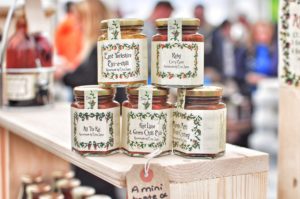by Jenny Rose | Oct 20, 2016 | Connection & Community, Emotional Intelligence
Last week I talked about balance as a first step to understanding reciprocity. This week I’ll refine my focus and discuss the term itself.
A few years ago I was in my car, either listening to an audio book or the radio. I was in the off phase of a painful and confusing on and off relationship. Whoever I was listening to asked the question: “Is he crying about you?”

Photo by Ian Espinosa on Unsplash
This was a real Aha! moment for me, because I myself was crying all the time and the answer to the question was no. I didn’t even need to think about it. I’d given him all the power. He was calling the shots. I wanted to be with him but he didn’t want to be with me — at least for the moment.
That was my first introduction to reciprocity. It didn’t come with context, language or tools, but that question was like a piece of grit in my eye and it continues to pop up in all my relationships.
Before we discuss it further, let’s define reciprocity. A 3-second internet search yields: “Exchanging things with others for mutual benefit.” Good enough.
What I understand now is that reciprocity is at the core of healthy connection and relationship. Whether we’re conscious of it or not, it matters. I see the presence of reciprocity as an indicator of equality. No one has power over anyone else. The playing field is level. Giving and receiving happen in balance. We see the needs of others as being as important as our own. Reciprocity is the old Golden Rule in action.

Photo by Alona Kraft on Unsplash
It sounds so easy. In fact, it is easy. A reciprocal relationship is a delight. Trust and respect are present. Drama and trauma are absent. Both parties show up with an intention to create healthy connection. Communication is loving, respectful and honest. Both parties take responsibility for their words, actions and choices. When we walk away from a reciprocal interaction we feel valued, understood, respected and connected — and so does the other party.
Reciprocity in relationships cannot be achieved if both parties are not internally balanced, which is why I started with balance last week. This is like boundaries. If we can’t manage our own boundaries within ourselves, we won’t have effective boundaries with others. If we don’t function well enough to self-care, make choices that reflect our priorities, and control our time and energy in a balanced way, we can’t create healthy, reciprocal relationships.
“Exchanging things with others” is not limited to concrete things. In fact, a commercial exchange doesn’t imply reciprocity at all. Reciprocal exchange means he heats water for my tea while I’m in the shower and I dry his socks in the dryer instead of on the line because he likes them soft. Reciprocity implies an equal but not necessarily identical contribution of time, energy, expression and caring. In many ways, it’s a subtle kind of dance. It’s a gift of ourselves to others.
Reciprocity is flexible, affectionate, creative, curious and cooperative. Reciprocity says: “What can I do? What do you need? What would be useful? What would create connection? Reciprocity requires we allow ourselves to be seen and we’re open to receiving as well as giving. It requires communication about what we want and what we can give.

Photo by Kevin Quezada on Unsplash
Sadly, I think many people have never experienced a truly reciprocal relationship with a human being, although many of us have with animals. If that’s true of you, then there’s an important question to explore.
Is it you or is it them?
What’s been true for me is that it’s both. I’ve only lately begun to truly self-care and develop a sense of being valuable in the world. Most of my life has been defined by my sense of failure. What this means is that I’ve been a people pleaser, which is to say inauthentic and without good boundaries and balance. Naturally, that created problems, as well as attracting all kinds of people into my life who were also dysfunctional.
I have no power to change the behavior of others, but I can certainly learn and grow myself. Having language and context for aspects of relationship is enormously helpful. Being able to ask the question “Is he/she crying about me?” forces me to take a wider view and keep an eye on reciprocity. It empowers me.
It’s a great mistake to assume everyone wants reciprocity. I always forget that piece. I can’t quite get my head around the fact that some folks have no desire to be in a relationship like this, but I know it to be true. I can’t explore that effectively, having a great longing for it myself, so I’ll leave that aspect alone, except to note it’s not effective to make up stories or have expectations and assumptions about another’s desire or intention in this arena. Reciprocity doesn’t exist without mutual consent and a willingness to share power. The good news is after you run into the absence of reciprocity (for whatever reason) enough times, you stop trying to force it.
It’s also worth noting there are many different forms of relationship, and lack of reciprocity doesn’t mean there’s no value in the connection. Not at all. The quality of our relationships declare and define themselves pretty quickly, it’s just that sometimes we’re so focused on our determination that things be a certain way, we don’t pause to consider what is actually present — and what is not. Denial is a powerful thing, and we can stay stuck in it for years.
Reciprocity is a high standard. If you decide you want it, many possible relationships will be disqualified in the early stages. On the other hand, if you accept nothing less than reciprocity in close relationships, the ones you do find will be joyful and vibrant, and you won’t have to cry alone in the first place, let alone wonder if your partner is, too.
(This is the second post in a series on reciprocity. See also Parts 1, 3, and 4.)

Photo by Evan Kirby on Unsplash
All content on this site ©2016
Jennifer Rose
except where otherwise noted
by Jenny Rose | Sep 22, 2016 | Power
This is the second of I’m not sure how many posts about boundaries. See last week’s post for the beginning of the discussion!
Today the aspect of boundaries I want to explore is the one I have the most trouble with. This aspect concerns managing boundaries with people we love.
Continuing with our metaphor of food on a shelf, last week I was comfortable with my identity of strawberry jam. I know who I am, I’m in an intact container (most of the time) and I intend to be labeled accurately and effectively. That’s all INTRApersonal start-where-you-are work.
However, there’s other food on the shelf. The universe doesn’t revolve around strawberry jam, alas! In fact, next to me is a jar of dill pickles.

Photo by Viktor Forgacs on Unsplash
We’ve been together as long as I can remember, sitting side by side on the shelf. We’ve watched other food in other containers come and go. The eggs in particular have quite the turnover rate. We’re companions, friends, and in fact it’s not an exaggeration to say I love Pickles.
But one day I notice something has changed. The clear green juice in the jar with floating bits of herbs and spices is getting cloudy. And is that — could it possibly be — grey fur along one side of a pickle?
Disaster. Catastrophe. It can’t be true. My beloved Pickles is beginning to grow fur. Everybody on the shelf knows what this means. Sooner or later, the refrigerator/cupboard/shelf Gods will cull Pickles. Gone forever.
I can’t imagine my life without Pickles.
Naturally, I want to help. No kind of food could possibly want to wear grey fur. There must be something I can do.
If I love Pickles, I must be able to fix this.
If I really, truly love Pickles, and my love is real and unselfish and unconditional (and Pickles is worth that kind of love), there’s a way for my love to fix this.
If I fail to fix this, my love is at fault.
That, ladies and gentlemen, eggs and bacon, is where I lose my boundaries. It’s all very clear and self-evident when it’s laid out in black type on the page, or in this case, screen. Love can’t fix everything. Love isn’t always enough. Sometimes we can’t “help” other people. Bad things happen to good people all the time. Loss is part of love. Right?
My brain understands this. My brain functions pretty well. My brain is not the problem. It’s my heart, my emotions, my stories, my beliefs and my expectations that are unruly and stubborn.

Photo by juan pablo rodriguez on Unsplash
Perhaps I haven’t explained it well, my connection with Pickles. I know him better than anyone. I understand him. He’s the most important person in my life. He’s part of who I am. If I lose him, I’ll lose part of myself. I thought nothing could ever part us, or damage our respect and trust in one another. In fact, we’re so close we don’t need boundaries.
(Naturally, he feels the same way about me. He doesn’t say so, but one doesn’t expect pickles to emote like strawberry jam.)
Loving fully and unconditionally means no boundaries, right? Isn’t that what we learn? If we love unselfishly, completely, without reservation, then boundaries are unnecessary and we can count on getting that same kind of love in return. Loving well equals being well loved. Isn’t that the way it works? Only a selfish bitch maintains boundaries, an unloving, cold woman, a ball breaker. Only an indifferent, unfit mother maintains boundaries between herself and her children. Only a judgmental, critical, power-hungry female protects herself with boundaries. Generous, attractive, truly loving people have no need of boundaries. They don’t count the cost. They always say yes. They give freely of their resources to whoever is in need without expectations or strings attached. They never keep score. They have no needs, these lucky, healthy, beautiful, abundant people. They feed and nurture the world.

Photo by Jordan Whitt on Unsplash
Boy, does this world need people like that. That’s the kind of woman/friend/mate/mother/daughter/sister I want to be. If I want to save Pickles, that’s the kind of person I have to be.
Here’s the thing.
I can’t be that. I’m not sure anyone can be that.
I’m not talking about ideology here. I’m not qualified for or interested in religious debate. What I’m saying is I can’t be a bottomless, endless nurturer and giver with no needs, and I’m not convinced anyone else can, either. I know some who say they can, pretend they can and/or expect others to be, but I’ve never met anyone who really lives like that — at least not long term. Not successfully and not happily, anyway.
But aren’t we supposed to?
Did I learn this wrong? Did I misunderstand? I can’t point to any one person who taught me this, after all. Did I make it all up? Or, alternatively, am I not the woman I think I am and aspire to be? Am I small, mean, petty, hypocritical and selfish? Am I unable to love the right way? Am I a fraud? Am I self-deluded?
Why am I in such chronic painful confusion about something my intellect sees so clearly? Why does it seem that managing boundaries INTERpersonally carries such a negative connotation? Why can’t I reconcile loving someone with all my heart with effective, appropriate boundaries between that person and me? What is the source of this cognitive dissonance?
Which is more devastating — people who have no boundaries themselves and bitterly resent mine, or people who maintain boundaries between us when I have none?
In the first case I feel trapped, resentful and intruded upon, and in the second I feel hideously rejected, unappreciated and used. Neither feel like healthy connection, but I call both love.
So here I am, side by side with Pickles on the shelf. We look at each other through the glass sides of our boundaries. I want to climb inside his container and take him in my arms, love him back into clear green juicy health, but if I do that I’ll start growing gray fur myself, and I know I can’t fix him at the same time I believe I should be able to. I want to run away, turn away, not know what’s happening, but I can’t.
There’s nothing I can do. My love is not enough. Grey fur is creeping over Pickles and I can’t avoid it, flee it or stop it. I can only wait and watch and sit here in my container, while Pickles sits in his.
RIP, Pickles.
All content on this site ©2016
Jennifer Rose
except where otherwise noted
by Jenny Rose | Aug 4, 2016 | Connection & Community, Emotional Intelligence
Stories. How many stories can you tell about your life?
Story has always been deeply embedded in the human experience. Every piece of art tells a story. We read, watch television, go to movies, listen to the news, fall in love with music. Stories, all.
Stories teach, entertain, connect, inspire and guide us.
Stories are prisons and torture chambers. They brainwash and manipulate. They can be powerfully limiting.
The paradox of story lies in the power we give it.
Think about a story from your own life. Something painful. Likely it’s a story you’ve told yourself many times. It’s important. It’s part of who you are and how you understand yourself. It’s a place from which you look at the world. It’s absolutely True. You know. You were there. It was such a crippling experience you can’t ever, ever forget.
Stories can’t happen in a void, so there’s an event of some kind, an action, a word, a relationship, other characters in your story.

Photo by Takahiro Sakamoto on Unsplash
Let’s say your story is about four people who spend an hour together on a walk. In that hour everybody sees, smells and hears, thinks and feels different things. After that walk, and maybe for years afterward, each of those four people can tell a story about that day, that walk, that experience. Every one of those stories is partly true. Every one of those stories is inadequate and incomplete. The truest story is the one all four people tell together. If one person’s story is refused, denied, disbelieved or lost, all four people have lost something important out of that hour of their lives. They’ve lost an opportunity for understanding, for compassion, for connection and for becoming just a little bit bigger.
The thing about story is that we create it. Something happens. We have an experience. We have feelings, like mad, glad, sad or scared. We have thoughts about our feelings. We make up a story. We tell it to ourselves over and over again as we try to make sense of our experience, or recover from some hurt. We believe our story to the point that we refuse to consider changing it. We behave as if our story is True.

Photo by SHTTEFAN on Unsplash
Now we have a story that imprisons us. The story has all our power. We hurt people, break relationships and viciously defend our story. We will kill people, including ourselves, to maintain our story. Not only that, others must accept our story in its entirety. They must never question it, add to it or take away from it. Our story becomes us. A threat to our story becomes a threat to our life.
We’ve made something up, chosen to believe in it and now it rules us.
A lot of people talk about truth and lies as though one is black and one is white. As a storyteller, a writer and a human being, I question that. What is truth, really? If I was walking with you on that day and I saw a beautiful grass snake and you saw a dangerous serpent, which one of us is lying? What is the truth? I was charmed, you were horrified. So, I must be a sensitive scientist type with big glasses and a mouthful of Latin. And you’re a beautiful, sexy woman with big boobs and brown eyes who needs to be taken care of in the terrifying outdoors.
There. That’s my story. I’m sticking to it. Don’t you dare try to give me a different version.
See what I mean?
Isn’t the truth that two people saw a snake and had two different experiences and sets of feelings around it? Don’t we all have histories, fears, beliefs, prejudices, expectations and filters through which we experience life? Are yours right and mine wrong? Are mine right and yours wrong?
Can’t we allow room for everyone to experience what they experience?
Some people lie, deliberately and with intent. We all know people like that. We learn quickly not to trust them.
Some people distort. They’re caught up in their story about themselves, about the world, about others. They’ve been deeply damaged and wounded, or they struggle with addiction, or they have health problems, or they take medication, or they struggle with mental illness. Am I prepared to call them liars?
No. But I recognize the danger of some of their stories.
Does investment in a distorted story mean the storyteller is not a valuable person worthy of love and compassion? I hope not. I’ve my own set of distorted stories. I think we all have.
Other, very dangerous people deliberately manipulate with story. They invalidate yours in favor of theirs. They tell you you’re wrong, you didn’t understand, you’re too sensitive, you’re too dramatic, you’re too crazy; you’re hateful, bigoted, disloyal, a liar. They tell you your story didn’t happen, that they didn’t hit you, even though there’s blood in your mouth.
So what do we do about story — ours and everyone else’s?
Maybe the most important thing is to be aware that much of what’s happening in our head is a story. It might be partly true. It might not be. It’s certainly part of something larger than our point of view. Our feelings are ours and we need to honor them, but our thoughts about our feelings can become a real problem.

Photo by Toa Heftiba on Unsplash
We could ask others about their stories. We could be open, curious, nonjudgmental, compassionate, respectful and prepared to be enriched by someone’s perceptions and experiences. We could, in short, build healthy connection.
If we’re holding tight to a story that hurts us, angers us, or is otherwise destructive, we could go to other characters in the story, tell them how we feel and ask for help understanding the situation.
We can build trust and respect with ourselves. We can claim the power and dignity to form our own opinions about others, based on our own observations and experience, and decide when to build connection and when to limit it. We can refrain from repeating destructive stories to or about others. We can take responsibility for our own rigidity and blind spots; our intolerance, injustice and poor communication skills, and own that we might make mistakes in judgement.

Photo by James Pond on Unsplash
We can be wary and watchful of people who impose their stories on us. Some people use story like a hammer and chisel, relentlessly splitting connection and relationship. In the end they hurt themselves the most, but many a relationship has been lost because of this kind of behavior.
We can pay attention to red flags such as feeling confused, feeling torn, feeling overwhelmed, feeling exhausted by drama, and feeling dragged down or being asked to keep destructive secrets. Healthy people in our lives who truly love us will never try to split us from others or force us to make a “them or me” choice. Healthy people do not share destructive personal stories about others publicly, nor do they tolerate or enable this kind of behavior. Healthy people communicate honestly, directly and clearly and recognize the ineffectiveness of black-and-white thinking.
In the end, our only power lies within the circumference of our own lives. If we want others to give us a chance to speak when someone tells a distorted story about us, we must do the same for them. If we want to be heard, understood and treated with respect and compassion, we must extend those to others. If we’re hurt and angry, we must find appropriate and effective ways to talk about that, either with a professional or with others in our story. We can’t control what others say and believe about us. We can only live the most authentic lives possible and hope that our actions and words speak for themselves. We can be responsible for our own stories.
For more on the power of story, here’s another blog you might be interested in. Same subject, different writer. It’s titled Who Are You?
Also, here’s a link to a remarkable teacher, Byron Katie, who asks, “Who are you without your story?” I highly recommend her.
Do your stories about yourself limit you? Do your stories about others limit them? Can you consider another version of one of your stories? What needs to happen for you to revise one destructive story you’ve created?
All content on this site ©2016
Jennifer Rose
except where otherwise noted
by Jenny Rose | Jul 21, 2016 | Choice, Power
I had some feedback on last week’s post indicating I’m not the only people pleaser around! Here are some good articles about learning to say no from Lifehacker, Zen Habits, and Psychology Today.
People pleasing is connected to several other pieces of interpersonal functioning, like boundaries, power, authenticity and integrity.

Photo by Jon Tyson on Unsplash
The inability to say yes is as problematic as the inability to say no. If you can’t say yes, your no is meaningless. If you can’t say no, your yes is meaningless. This damages relationships with others, sure, but I think the more significant damage occurs in our relationships with ourselves. How can we trust ourselves if we don’t take responsibility for making and communicating honest choices?
It doesn’t matter if the relationship we look at is professional, family, peer or romantic. If we’re too cowed to give an honest yes or no, how healthy is that relationship? Why is someone trying to take away our power and, more importantly, why are we letting them?
I know. Love. Obligation. Even fear. But wait.

Photo by Gemma Evans on Unsplash
Do you feel loved when you can’t speak an honest yes or no without receiving indifference, withdrawal, scorn, drama, rage, sarcasm, a physical blow, tears or an emotional outburst? Maybe your intention is to love and be loved, but is that really happening? How can you be loved if you’re not showing up honestly? If you’re loved for your compliance, your compliance is what’s getting loved, not you.
Do we have an obligation and a duty to be connected to people who don’t respect our yes and no? Do we owe that to someone because they’re family, or someone we have history with, or our boss, or someone we want to love or be loved by? Who says? Did you sign a contract at some point?
And then there’s fear.
At this point in my life I’m not as concerned as I once was about making the wrong choice, whatever that means. I’m more interested in being clear about the choices I am making and why.
So, just to be clear, I’m choosing to stay in relationship with (fill in the blank), even though I’m not allowed to say yes or no honestly without (fill in the blank). I’m doing that because I hope one day they’ll love me, or because I owe it to them, or because I’m afraid of them. I’m doing it, in short, because they have something I think I need.
Now, pay attention.
They have something I need.
Do they really? Are we sure? Is the job or relationship or inheritance or influence more important than our ability to live authentically and fully in our own power?
If your answer to that is yes, I understand. I was in an abusive marriage for a time because I had two young children, no job, no car, no money, no childcare and no hope. I deliberately chose that relationship because I didn’t know how to survive without the financial support my husband provided. My children and I paid a heavy price, but he did help keep us afloat during a critical time. The marriage didn’t last, of course. Even now, on a summer morning more than twenty years later, I don’t know what else I might have done. I don’t know what might have happened to us if I hadn’t made the choice I made. Maybe something much healthier. Maybe a homeless shelter.
This, my friends, is the ancient and powerful archetype of prostitution, and we all participate in it in some way at some point in our lives. It’s part of being human and is much larger than the specifics of sex. More on archetypes later.
When you look at your relationships through this filter of making and communicating honest choices, what do you see? What’s your role in this dynamic? Are you the one who can’t say yes or no, or are you the one who can’t hear them? Why are you engaged in this dynamic? How is it working for you? Are you happy with yourself, and with your connections? Are you interested in learning how to do things differently?
All content on this site ©2016
Jennifer Rose
except where otherwise noted












